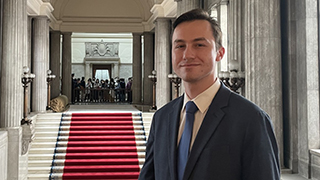Seton Hall University Joins Harvard Business School Affiliated Network - Seton Hall University
Tuesday, December 14, 2021

The network is part of the Institute for Strategy and Competitiveness, a nonprofit research and education organization based at Harvard Business School and founded by academic and business theorist Michael Porter. Its members teach following Porter's MOC curriculum, which explores the determinants of competitiveness and successful economic development viewed from a bottom-up, microeconomic perspective.
As part of this affiliation, faculty from the College of Arts and Sciences and the Stillman School of Business will develop a course that combines business and humanities methodologies and perspectives for interdisciplinary integration led by Professor of Management A. D. Amar, Ph.D., and Professor of Religion and Director of Catholic Studies, Ines Murzaku, Ph.D.
"Being an affiliate of the Institute for Strategy and Competitiveness at Harvard Business School will be beneficial to Seton Hall, allowing the university to use Harvard expertise in cluster development and networking with more than one hundred universities worldwide which are part of the Harvard Business School network," said Katia Passerini, Ph.D., Provost and Executive Vice President. "Pedagogically, the Harvard case-method teaching will be beneficial to Seton Hall students. It prepares students to search for solutions to real-life problems. This pedagogy which involves a holistic, multi-disciplinary approach brings real-world problems to the classroom, thus making a global classroom."
The course will apply the MOC case-study-curriculum to develop holistic perspectives on the interplay between competitiveness and the promotion of human development for an equitable society. Ultimately, the course’s goal is to cultivate the spirit of competitiveness, cluster thinking and innovation in students while preparing them for how to accept the profit that comes as a result of ethical and effective service.
"I am just thrilled about this affiliation, which fully aligns with the University’s strategic goals of strengthening academic quality and enhancing interdisciplinarity," said Joyce A Strawser, Ph.D., Dean of the Stillman School of Business. "Our students will greatly benefit from the new course that has been proposed, an offering that will leverage the talents and perspectives of both our business and humanities faculties. I am so proud of Dr. Amar and Dr. Murzaku for their leadership in securing this highly selective opportunity for Seton Hall University, and I look forward to the collaborations and innovations that this affiliation will surely inspire."
"Thanks to Dr. Murzaku and Dr. Amar's dedication, the updated Microeconomics of Competitiveness case-method pedagogy of the Harvard Business School will be applied to the new team-taught course at Seton Hall. Our students will greatly benefit from this interdisciplinary course," added Georita M. Frierson, Ph.D., Dean of the College of Arts and Sciences.
Commenting on the course's goals and vision, Amar explained: "We expect this to be a campus-wide course because the competitiveness concepts are applicable in any area. Seton Hall University has many academic units with many different subject areas, but they all come together when it comes to the understanding of microeconomics and its application to their customers and markets, and demand and supply. Any student, at any level – with preference given to graduate students – will benefit from this course, as it will prepare them to do a more effective, efficient, and productive job on whatever they do in their professions."
Murzaku further emphasized the focus of the project is rooted in people who work in teams – showcased through the network's existing international collaboration dedicated to advancing interdisciplinary scholarship benefiting local people, local economies, nations and policymakers.
"The synergy in innovation among the affiliate faculty of the Institute for Strategy and Competitiveness is beneficial to productivity and finding long-term solutions to real problems. The solutions offered by the cases studied and applied by the network institutions advance society and the common good which means working together for the good of the whole, because economic development is indeed social development – one cannot take place without the other," said Murzaku.
For more information on the MOC Affiliate Network, please contact Ines Murzaku, Ph.D., or A. D. Amar, Ph.D.
Categories: Arts and Culture, Business






